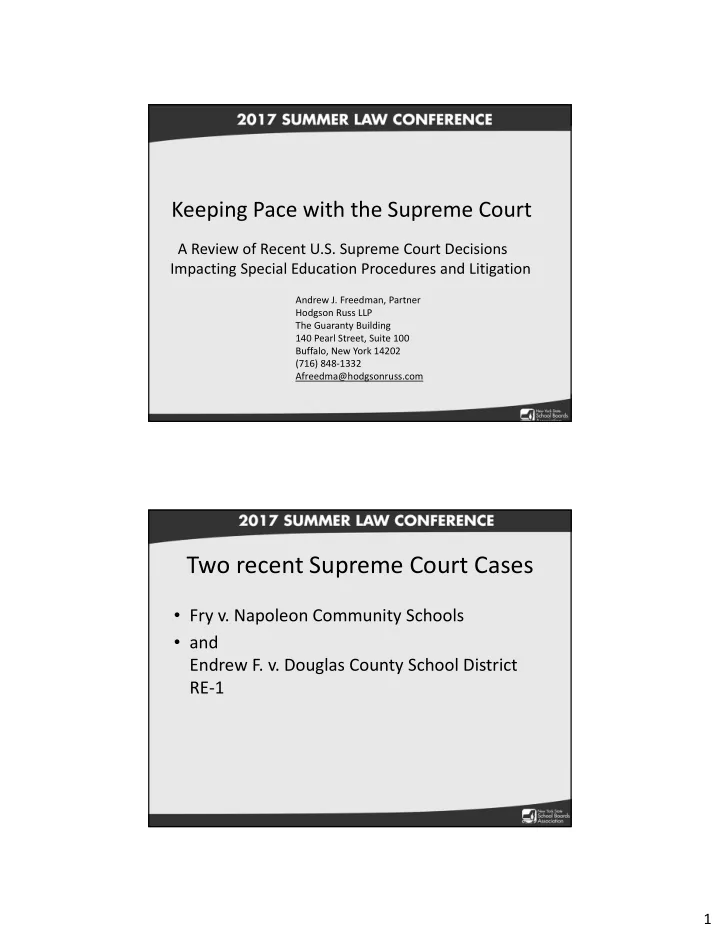

Keeping Pace with the Supreme Court A Review of Recent U.S. Supreme Court Decisions Impacting Special Education Procedures and Litigation Andrew J. Freedman, Partner Hodgson Russ LLP The Guaranty Building 140 Pearl Street, Suite 100 Buffalo, New York 14202 (716) 848 ‐ 1332 Afreedma@hodgsonruss.com Two recent Supreme Court Cases • Fry v. Napoleon Community Schools • and Endrew F. v. Douglas County School District RE ‐ 1 1
Fry v. Napoleon Community Schools • At issue in this case was Wonder the Goldendoodle since the student used a service dog for assistance with various life activities • The parents enrolled the student in the Ezra Eby School and requested that Wonder accompany the student to school Fry v. Napoleon Community Schools • The student used the dog to live as independently as possible • The dog would help her balance, open and close doors, turn off lights , and toileting • The school assigned the student an 1:1 aide to assist with these tasks 2
Fry v. Napoleon Community Schools • Parents rejected the 1:1 aide service and claimed the school was denying the student FAPE • Wonder was allowed to briefly accompany the student in school on a trial period • However, after trial period school administrators informed parents that Wonder was not welcome in school. Fry v. Napoleon Community Schools • Parents withdrew student from school and filed complaint with OCR • OCR ruled that Wonder’s presence in school not required for FAPE but was discrimination under Section 504 and ADA • According to OCR a school could provide FAPE but still violate other laws 3
Fry v. Napoleon Community Schools • Parents then sued in District Court and Sixth Circuit Court of Appeals • Sixth Circuit dismissed the parents lawsuit concluding they failed to exhaust administrative remedies • Parents appealed this decision to the US Supreme Court Fry v. Napoleon Community Schools • US Supreme Court reversed Sixth Circuit ruling and unanimously agreed with parents • Court concluded that parents do not have to exhaust IDEA procedures in every lawsuit concerning a disabled child. • Consideration must be given to whether the dispute centers around the IDEA and FAPE 4
Practical Implications • If case involves FAPE then IDEA procedures must be followed • If case does not involves discrimination, then parent is not required to exhaust IDEA procedures • 504 and IDEA are entirely separate processes that need to be reflected in Board policy and regulation Practical Implications • Review 504 policies for burden of proof and selection of hearing officers • Districts must be diligent in assuring that FAPE based claims remain under IDEA • School must analyze FAPE and any other legal obligations when considering parent requests. 5
Endrew F. v. Douglas County School District RE ‐ 1 • 4 th grade student diagnosed with autism • IEP addressed his educational and functional needs but parents were dissatisfied with his progress • Student was making some progress however student also continued to exhibit intense behavior Endrew F. v. Douglas County School District RE ‐ 1 • Goals and objectives on IEP had been carried over from prior years without significant updates • Parents claimed 5 th grade IEP continued to be the same, withdrew him from school, and placed him in private school • The parents initiated an impartial hearing seeking reimbursement for the unilateral placement 6
Endrew F. v. Douglas County School District RE ‐ 1 • Impartial Hearing Officer ruled in favor of District holding FAPE was provided • Parents appealed to District Court and Tenth Circuit Court of Appeals • Both courts affirmed IHO’s decision • Ten Circuit relied on Rowley decision that IEP was adequate so long as it was reasonably calculated to confer an educational benefit that was merely “more than de minimus ” Endrew F. v. Douglas County School District RE ‐ 1 • Parents appealed to the US Supreme Court • US Supreme Court rejected Rowley and articulated new substantive standard: – A school must offer an IEP reasonably calculated to enable a child to make progress appropriate in light of the child’s circumstances • The Court further stressed that the adequacy of an IEP turns on the unique circumstances of the child for whom it was created for. 7
Practical Implications • Second Circuit (which encompasses New York) has been applying the IDEA in a way similar to the Endrew F. standard. • However, in closely contested cases hearing officers and judges may view the Endrew F. standard as tipping the balance in favor of parents. Practical Implications • CSE’s must evaluate each student on an individual basis and consider his or her particular unique circumstances. • IEPs should be drafted with a view towards individual needs and circumstances. They should never be viewed as a form document • When drafting goals (and objectives if necessary) consider the progress the student has made and do not carry over in a mechanical fashion. 8
Questions? Andrew J. Freedman, Partner Hodgson Russ LLP The Guaranty Building 140 Pearl Street, Suite 100 Buffalo, New York 14202 (716) 848 ‐ 1332 Afreedma@hodgsonruss.com 9
Recommend
More recommend